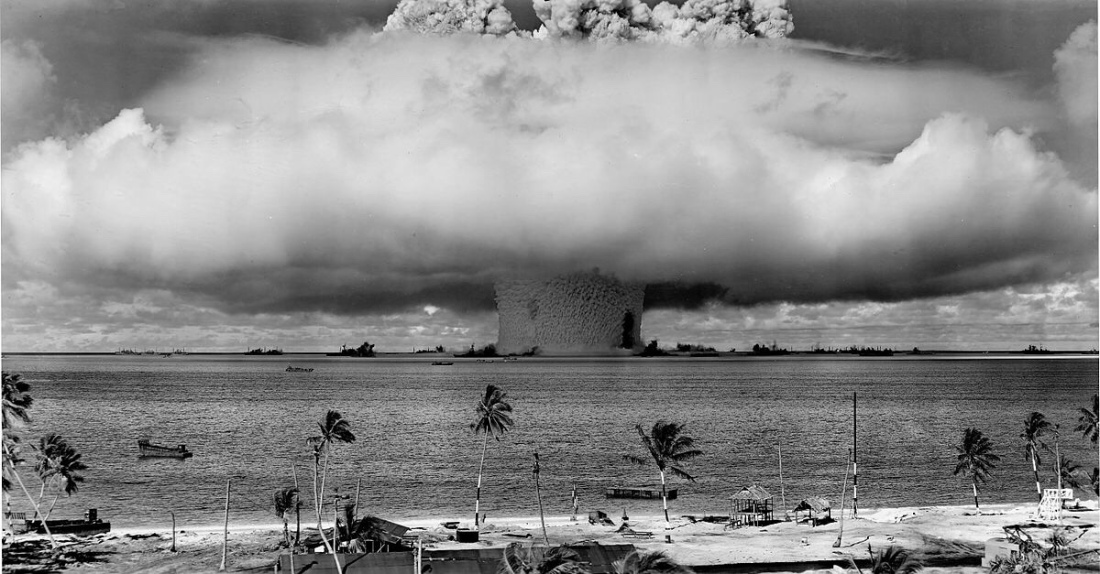 This Nuclear Arms Race Is Worse Than the Last One
This Nuclear Arms Race Is Worse Than the Last One
By Andreas Kluth | Bloomberg
As long as the pandemic rages, the world’s leaders are understandably preoccupied with the threat of disease. But there are other dangers to humanity that demand attention. One of the most frightening is nuclear war. Unfortunately, the risk of that happening keeps rising.
The headline numbers are misleading. Yes, the global stockpile of nuclear warheads decreased slightly last year, according to the latest report by the Stockholm International Peace Research Institute. But that’s only because the U.S. and Russia, the two countries that still account for more than 90% of global nuclear stocks, dismantled some of their obsolescent warheads.
Meanwhile, all nine countries with nukes are modernizing their other warheads and delivery systems. In a test just last week, France successfully fired, from a submarine, a nuclear missile that can travel between continents at 20 times the speed of sound. Other countries, most notably China, are adding to their nuclear stashes as fast as they can.
Even more worryingly, states are reviewing their strategies for using these weapons. Gone is the amoral but logical stability of the Cold War, when two superpowers kept each other and the world in check with a credible threat of “Mutual Assured Destruction” (MAD).
Russia, for instance, increasingly sees smaller “tactical” warheads as a possible way to compensate for weaknesses in its other military forces. It’s conceivable that a conflict starting with hybrid warfare — ranging from disinformation campaigns to soldiers in unmarked uniforms — could escalate to a conventional war and a limited nuclear strike, inviting a counter strike and so forth.
There’s also speculation that India could soften its policy, adopted in 1998, never to be the first to use a nuclear weapon. Such thought experiments are no small matter for a country with two hostile and nuclear-armed neighbors, Pakistan and China. Just this week, India and China clashed again over their disputed border in the Himalayas. What North Korea could get up to in a crisis that it itself provokes is anybody’s guess.
Meanwhile, all efforts to limit or reduce nuclear weapons have ground to a halt. A treaty between the U.S. and the Soviet Union that eliminated land-based missiles with short and intermediate ranges collapsed last year, after the U.S. accused Russia of cheating.
And the two old foes aren’t even close to extending their only remaining arms-control agreement, called New START, which expires in February. One reason for that failure was America’s insistence that the third and rising superpower should join the negotiations. But China, which sees itself as merely catching up with the two nuclear kingpins, balks at accepting any limits.
Progress has also stalled in updating the Treaty on the Non-Proliferation of Nuclear Weapons, exactly 50 years after it took effect. It sought to keep additional countries from making bombs by encouraging them to use fissile material (uranium or plutonium) only for civilian purposes such as generating electricity. But five countries have gone nuclear since it was signed. Worse, game theory suggests that it’s rational for more states to follow. Iran could be next.
The only international agreement to ban these evil weapons altogether, the Treaty on the Prohibition of Nuclear Weapons passed by the United Nations in 2017, has the same chance as a snowball in a fission event. No member of the nuclear club intends to ratify it, nor do many other countries.
As if all that weren’t bad enough, doubt is also creeping into the transatlantic alliance, undermining its credibility and thus the deterrence that’s so vital to preventing war. Germans, in particular, are aghast at their treatment by U.S. President Donald Trump, who this week chastised them as “delinquent” allies and confirmed that he will withdraw about one in four American troops from Germany.
In May, several leaders of Germany’s Social Democrats, a party with a tradition of anti-Americanism, even suggested opting out of NATO’s policy of “nuclear sharing,” whereby some allies, such as Germany, forego building their own nukes but provide the airplanes to deliver U.S. bombs in a pinch. This policy is meant to make joint deterrence more credible. But to German lefties, distrust of Trump is enough reason to challenge its logic. Fortunately, Chancellor Angela Merkel quickly overruled them.
Between naivety in Germany, belligerence in Russia, ambition in China, inanity in Trumpist America and brinkmanship in North Korea, the outlook is grim. Egomaniacs or rogues could be tempted to test the boundaries in their foes’ deterrence plans, and human error could compound the folly.
What’s more, the climate in international relations isn’t exactly conducive to solutions. The world leaders who matter most are so busy with “trade wars” and “vaccine nationalism,” they can barely even imagine sitting around a table with people they loathe but should talk to, an activity known formerly as diplomacy.
But they must rise above themselves. If they can’t, the rest of us, from voters to the military brass, should force them. Only patient multilateralism, as unsexy as that polysyllabic Latin word may sound to alpha males, can save us in the long run. Otherwise, to use a Cold War metaphor, the nations of the world will find themselves standing in a room awash with gasoline, each counting who has how many matches, until one is lit.
This column does not necessarily reflect the opinion of the editorial board or Bloomberg LP and its owners.
Andreas Kluth is a columnist for Bloomberg Opinion. He was previously editor in chief of Handelsblatt Global and a writer for the Economist. He’s the author of “Hannibal and Me.”
For more articles like this, please visit us at bloomberg.com/opinion
No comments:
Post a Comment